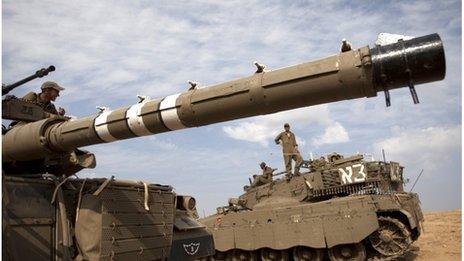International support for attack on Gaza in the balance
- Published

International support for Israel could melt away if ground troops are sent into Gaza
A turning point has been reached in the Gaza conflict.
Israel was effectively given a window within which to act by its key allies in the US and Europe, who largely held Hamas responsible for this upsurge in fighting.
But now that window is closing.
If Israel continues with its air operations, the civilian death toll will only mount further and the diplomatic support for Israel will melt away.
A weekend of frantic diplomatic activity involving Egypt, Turkey and Qatar has so far produced little.
But the common goal now is to try to halt this conflict before Israel unleashes a ground operation which will only push the casualty toll ever higher.
British Foreign Secretary William Hague said in Brussels on Monday that international backing for the Israeli operation would be threatened by the use of troops.
"A ground invasion is much more difficult for the international community to sympathise with or support, including the United Kingdom."
Goals achieved
In truth, there is little enthusiasm in Israel - either in the government or among the military top brass - for a ground incursion into the Gaza Strip.
Israeli military analysts believe that a large part of Israel's military goals were achieved during the opening two days of this conflict.
As the air campaign goes on, Israel faces diminishing returns.
The increase in the number of civilian casualties inflicted in the Gaza Strip, and the consequent shift in international support for Israel, probably weighs more heavily than any modest advantages in terms of destroying additional rockets or Hamas infrastructure.
It should be remembered that it was the present Israeli Defence Minister, Ehud Barak, who, in the same post back in 2008-009, had wanted to halt Israel's last major incursion into Gaza after its initial few days.
He was overruled by the then Prime Minister Ehud Olmert and a more hawkish chief-of-staff.
But in the absence of a settlement, with Israeli forces massed and ready to roll, a ground phase still cannot be ruled out.
So how best to bring about a halt to the fighting?
Any de facto deal to end this crisis will be informal - Israel and Hamas are not going to sit down and sign a piece of paper.
Both want to emerge with something to show from this crisis.
For the Israelis, their goal is a halt to the rocket fire and a lengthy period of calm. This means that Hamas will also have to try harder to control more radical groups seeking to maintain the military struggle against Israel.
For its part, Hamas wants to get some tangible benefits too, be it the opening of crossing points or other measures to reduce what many Palestinians see as "the state of siege" that characterises their daily lives.
Hamas itself could do with calm - not least to rebuild its shattered arsenal - and unlike the more radical groups to its flank, it has governing responsibilities.
Opportunity

A Palestinian missile strike on Tel Aviv would complicate attempts to de-escalate the crisis
The visit to the region by UN Secretary-General Ban Ki-moon may provide a framework into which elements of the current diplomatic discussions can be slotted.
His visit certainly provides an opportunity for the Israelis to draw back from the brink and perhaps put a ground operation on hold.
Much may depend upon the volume of rocket fire from Gaza and crucially on what these rockets hit.
A strike on a populated area of Tel Aviv or Jerusalem would almost certainly change the calculations.
But one of the reasons that diplomacy has so far been unable to halt the fighting is that the "diplomatic wiring" in the region has changed significantly.
The lack of close ties between Israel and Turkey is one factor. But even more important is the change of government in Egypt - now more sympathetic in some ways to the Palestinians and certainly more suspicious of Israel.
Tried and tested conduits that have mitigated conflicts in the past no longer operate in quite the same way.